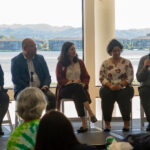Search
Perspective: Russell
March 10, 2023
What We Talk About When We Talk About Housing
By Russell Brautigam, UWBA Ambassador
“Despite my progress, finding affordable housing in the Bay Area was an ongoing struggle.”
The conversation around poverty and affordable housing tends to focus on the tension between property and policy. Sometimes people get lost in that shuffle. This is one of the reasons United Way Bay Area (UWBA) is so committed to keeping voices like mine at the center of the discussion.
When we talk about affordable housing, we’re not just talking about a location or a dwelling. We’re also talking about the way we take care of one another, recognizing each other’s wants to be productive members of society regardless of our challenges, and how we help make the path forward possible so that everyone can lead a life with dignity.
I am part of the UWBA Ambassadors Council, which means I have lived experiences with UWBA programs and services. But it’s been a long and difficult journey, that for me, really goes back to 2013. I had a falling out with my mother and was forced to leave my home. I reached out to anyone I could for help, and thankfully a friend and his parents took me in. They were connected with a regional support center, which is where I was diagnosed with autism.
During the year I spent with this family, they taught me life skills that might seem basic but were not things I had learned in my home life, like the importance of a good work ethic for example. They even helped me get my GED. From there, I was referred to *SparkPoint for financial coaching. With their support, I was able to raise my credit score from 660 to 800 over the course of two years, which is where it sits today.
But despite my progress, finding affordable housing in the Bay Area was an ongoing struggle.
I lived in a group home for almost five years, which was a miserable experience due to the poor living conditions and lack of maintenance. I then moved to a family housing agency, but the family was not a good fit given my diagnosis. They were loud and disruptive, causing me to have multiple breakdowns. I eventually had to be relocated to a more sustainable place in Antioch.
The regional center was supposed to help me navigate the system, but they were so overwhelmed that they were effectively useless, and it took a crisis for them to finally step in and take care of me.
“My story is one example, although there are many, of what happens when the systems designed to help those in need become ineffective.”
I was being bounced around, all the while trying to secure a place of my own. When, after nine and a half years, I finally received a Section 8 housing opportunity. Unfortunately, that first opportunity would have required me to move to Sonoma County and be cut off from my support network and the public transit system. So, I continued to wait and search.
The primary problem is that Section 8 is horribly underfunded, receiving only a quarter of what it really needs to supply all the people who qualify for it, let alone those who have special needs. This also means the people working in the system are overworked and underpaid, so they don’t have the time to focus on individual cases like mine, even to help with a problem I can’t handle on my own.
When they would discuss housing options, their solutions often included moving me away from the Bay Area, which is something that isn’t really a possibility for me. I need to stay within the vicinity of public transit so I can get to work and do business in San Francisco. I don’t have a car and can’t afford one, even with Section 8 assistance.
I did eventually find my apartment, but only by sheer coincidence.
It’s been a challenging journey, but I’ve come a long way since 2013 and continue to work towards improving my situation. My mental health is the best it’s ever been, I’m financially stable, and exploring even more employment opportunities – this is what a path to leading a life with dignity looks like.
My story is one example, although there are many, of what happens when the systems designed to help those in need become ineffective. It’s a reminder of how important it is to ensure these systems and services are efficient and accessible so that individuals like me, who have faced adversity, may be better able to escape the cycle of poverty.
We must make sure that affordable housing is available to all those who need it. Let’s work together to ensure everyone has equitable access to a safe and stable living environment.
*When you support United Way Bay Area, you help make sure the people who want to break the cycle of poverty can access the resources necessary to do so. You’re helping programs like SparkPoint, which provides financial coaching, work with people like Russell to create effective strategies for long-term economic stability even while navigating sometimes unpredictable systems.



